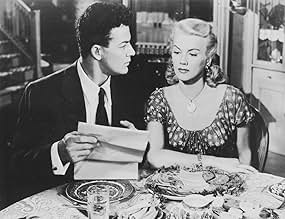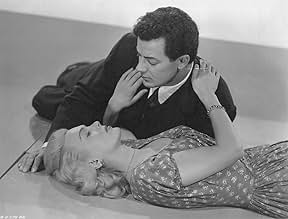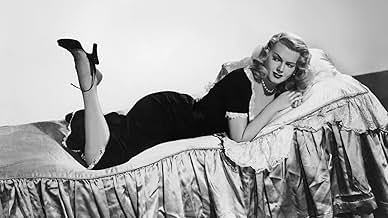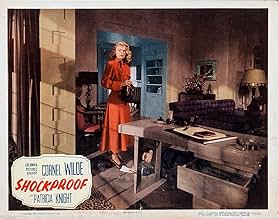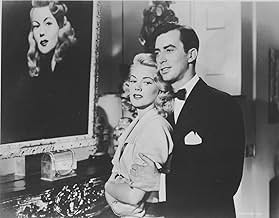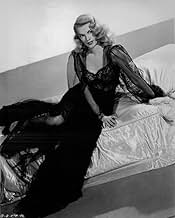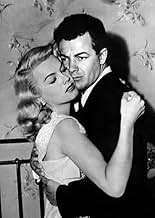AVALIAÇÃO DA IMDb
6,5/10
2,7 mil
SUA AVALIAÇÃO
Adicionar um enredo no seu idiomaA parole officer falls in love with his client, a ravishing blonde who served time for murder, and he's determined to help her go straight despite her interfering criminal boyfriend.A parole officer falls in love with his client, a ravishing blonde who served time for murder, and he's determined to help her go straight despite her interfering criminal boyfriend.A parole officer falls in love with his client, a ravishing blonde who served time for murder, and he's determined to help her go straight despite her interfering criminal boyfriend.
- Direção
- Roteiristas
- Artistas
Shirley Adams
- Emmy
- (não creditado)
Gilbert Barnett
- Barry
- (não creditado)
Richard Benedict
- 'Kid' - Knife Wielder
- (não creditado)
Paul Bradley
- Airline Clerk
- (não creditado)
Argentina Brunetti
- Stella
- (não creditado)
Paul Bryar
- Man in Car
- (não creditado)
John Butler
- Sam Green, Pawnbroker
- (não creditado)
Claire Carleton
- Florrie Kobiski
- (não creditado)
Cliff Clark
- Mac - Police Lieutenant
- (não creditado)
King Donovan
- Joe Wilson
- (não creditado)
Al Eben
- Joe Kobiski
- (não creditado)
- Direção
- Roteiristas
- Elenco e equipe completos
- Produção, bilheteria e muito mais no IMDbPro
Avaliações em destaque
The title is ponderous - There are no "shocks" in this film or anything that would need you to be resistant to them. Just a catchy irrelevant title I guess.
Griff Marat ( Cornell Wilde) is a straight arrow of a parole officer with political ambitions. His latest charge is a woman, Jenny Marsh (Patricia Knight) who has just left prison after five years. Griff gets her a room and a job, but most importantly tells her she cannot see her old friends anymore, in particular, Harry Weeson, the man she killed for. But she is very beholden to Harry because he has waited these five years for her. Griff says that if he has waited that long he can wait awhile longer.
So you have young handsome single Griff, from an ethnic background that marries young, that can't afford any scandal if he wants to go up in the world. You have confused but beautiful Jenny who feels obliged to somebody she did time for. Shouldn't it be the other way around? And Weeson is hard to figure out. He's more of a professional gambler than a mobster, doesn't appear to be cheating on Jenny, and I never could figure out exactly what he wanted from her.
The killing Jenny did is never explained. If she was defending Weeson's life, why was it a crime? If it was her just killing somebody who was a nuisance to him, why is she out in only five years? Actress Patricia Knight is believable in this role, and although she is Wilde's wife at the time, she also looks much like Douglas Sirk favorite, Dorothy Malone, minus Malone's electricity. The reason I bring that up is Sirk directed this film.
The first 60% of the film really has no surprises. It took one of several paths I saw it taking from the start. But then the last third is really out in left field with Griff abandoning everything I thought that made him tick and with him showing himself to be much more wily than I thought him capable.
There is one really shocking scene when one parolee is told he is going back to prison. He begs to differ in a big way. It's definitely a Fuller touch - Sam Fuller wrote the script. But as for that ending, somebody must have locked Fuller in a broom closet and rewrote whatever ending he proposed. I'd recommend this one just because it is so very odd.
Griff Marat ( Cornell Wilde) is a straight arrow of a parole officer with political ambitions. His latest charge is a woman, Jenny Marsh (Patricia Knight) who has just left prison after five years. Griff gets her a room and a job, but most importantly tells her she cannot see her old friends anymore, in particular, Harry Weeson, the man she killed for. But she is very beholden to Harry because he has waited these five years for her. Griff says that if he has waited that long he can wait awhile longer.
So you have young handsome single Griff, from an ethnic background that marries young, that can't afford any scandal if he wants to go up in the world. You have confused but beautiful Jenny who feels obliged to somebody she did time for. Shouldn't it be the other way around? And Weeson is hard to figure out. He's more of a professional gambler than a mobster, doesn't appear to be cheating on Jenny, and I never could figure out exactly what he wanted from her.
The killing Jenny did is never explained. If she was defending Weeson's life, why was it a crime? If it was her just killing somebody who was a nuisance to him, why is she out in only five years? Actress Patricia Knight is believable in this role, and although she is Wilde's wife at the time, she also looks much like Douglas Sirk favorite, Dorothy Malone, minus Malone's electricity. The reason I bring that up is Sirk directed this film.
The first 60% of the film really has no surprises. It took one of several paths I saw it taking from the start. But then the last third is really out in left field with Griff abandoning everything I thought that made him tick and with him showing himself to be much more wily than I thought him capable.
There is one really shocking scene when one parolee is told he is going back to prison. He begs to differ in a big way. It's definitely a Fuller touch - Sam Fuller wrote the script. But as for that ending, somebody must have locked Fuller in a broom closet and rewrote whatever ending he proposed. I'd recommend this one just because it is so very odd.
Real life husband and wife Cornel Wilde and Patricia Knight star as parole officer / parolee in this quasi noirish post-war drama. Wilde, who is assigned as Knight's parole officer, insists that as a condition of her parole she no longer associate with her former boyfriend, unsavory gambler (John Baragrey). Wilde who is smitten almost immediately by Knight, begins to bend the rules as Knight ignores the conditions of her parole and continues to see Baragrey. Because of her parole violations, Wilde being a concerned officer of the court, suggests Knight move into his home that he shares with his blind, widowed mother and younger brother. The situation continues on a downward trend.
Written by hard edged, cigar chomping, World War II vet Samuel Fuller and directed by melodrama master Douglas Sirk, this movie is a contrast of styles between writer and director. In this case the director Sirk called the shots. With the assist of a script revision from Helen Deutsch (I'll Cry Tomorrow, Valley of the Dolls), Sirk plays it out more as a tortured romantic triangle with dribs and drabs of writer Fuller's permeating cynicism occasionally popping through.
Despite a title suggesting more lurid content, 'Shockproof' offers little to actually be shocked by, probably because of the lack of any real criminal intent by the characters beyond parole violations. What tension this movie engenders is more human conflict from the soap opera style re-draft by Deutsch. With a script basically hollowed from Fuller's fatalistic influence, what's left is a sort of a well-crafted but tepid potboiler complete with a contrived populist ending.
'Shockproof' isn't a bad movie just more of a disappointment of what could have been.
Written by hard edged, cigar chomping, World War II vet Samuel Fuller and directed by melodrama master Douglas Sirk, this movie is a contrast of styles between writer and director. In this case the director Sirk called the shots. With the assist of a script revision from Helen Deutsch (I'll Cry Tomorrow, Valley of the Dolls), Sirk plays it out more as a tortured romantic triangle with dribs and drabs of writer Fuller's permeating cynicism occasionally popping through.
Despite a title suggesting more lurid content, 'Shockproof' offers little to actually be shocked by, probably because of the lack of any real criminal intent by the characters beyond parole violations. What tension this movie engenders is more human conflict from the soap opera style re-draft by Deutsch. With a script basically hollowed from Fuller's fatalistic influence, what's left is a sort of a well-crafted but tepid potboiler complete with a contrived populist ending.
'Shockproof' isn't a bad movie just more of a disappointment of what could have been.
A parole officer falls for one of his charges, but is she playing him for a sucker? Not so much a noir as a noir-esque romantic melodrama, and not up to the level of the best from either director Douglas Sirk or writer Sam Fuller. The story could have gone one of two ways, and it chose the less interesting path (from what I've read, this might have been a studio decision). However, Cornel Wilde and Patricia Knight (actual spouses at the time) handle their performances quite well, and play off each other with conviction and chemistry. The script has some nice touches, the photography is pretty sharp, and the supporting roles are good. It's certainly a watchable movie, just rather bland... and it wraps up far too easily.
If the movie were an airplane, then it wobbled a lot before finally crashing and burning with an utterly illogical ending. Up to that point, this crime drama is mediocre at best. The best part follows the couple (Wilde and Knight) as they flee the cops after running out on Knight's parole and in the process sinking into society's lower depths. That 20 minute sequence is done with both flair and zip.
Director Douglas Sirk is known for artistic soap opera, so it's not surprising that this film emphasizes the love story over the crime element. The trouble is that Wilde is woodenly uninvolving, while Knight's character remains muddled, to say the least. A key part of the plot lies in tracking her evolving emotions. But that's hard to do since these developments are confusingly portrayed, helped neither by the turgid script nor by Knight's thespic limitations. Apparently cult movie-maker Sam Fuller co-authored some of the screenplay, which, on the face of it, seems hard to believe. Nonetheless, I'm sure he had nothing to do with the ridiculous climax that instead smacks of outside interference of the most thoughtless kind.
Calling this a noir film is, I think, a stretch. It's certainly not filmed as noir, with none of the usual trademark light and shadow. True, the plot contains a number of noirish elements, but Sirk's style doesn't bring these out in recognizably noir fashion. Even so, the many SoCal location shots are both entertaining and appropriate for crime drama. (Too bad we don't get more of the dingy oil field setting, which has definite and exotic noir potential.) But noir or not, this is a rather poorly done crime drama, having neither the force nor the panache of the better examples of the period. With better casting, a more cogent screenplay, and more attention to the oil field, this could have been a memorable film.
Director Douglas Sirk is known for artistic soap opera, so it's not surprising that this film emphasizes the love story over the crime element. The trouble is that Wilde is woodenly uninvolving, while Knight's character remains muddled, to say the least. A key part of the plot lies in tracking her evolving emotions. But that's hard to do since these developments are confusingly portrayed, helped neither by the turgid script nor by Knight's thespic limitations. Apparently cult movie-maker Sam Fuller co-authored some of the screenplay, which, on the face of it, seems hard to believe. Nonetheless, I'm sure he had nothing to do with the ridiculous climax that instead smacks of outside interference of the most thoughtless kind.
Calling this a noir film is, I think, a stretch. It's certainly not filmed as noir, with none of the usual trademark light and shadow. True, the plot contains a number of noirish elements, but Sirk's style doesn't bring these out in recognizably noir fashion. Even so, the many SoCal location shots are both entertaining and appropriate for crime drama. (Too bad we don't get more of the dingy oil field setting, which has definite and exotic noir potential.) But noir or not, this is a rather poorly done crime drama, having neither the force nor the panache of the better examples of the period. With better casting, a more cogent screenplay, and more attention to the oil field, this could have been a memorable film.
Patricia Knight has just been paroled. Her parole officer is Cornell Wilde. He reads off the list of restrictions which she has already memorized. She almost immediately breaks them when she sees her former lover, gambler John Baragrey in a bookie shop, but Wilde gives her another chance. She loses her job, so her takes her into his home to take care of his blind mother. Soon they are in love. She goes to Baragrey's apartment to tell him goodbye. He calls Wilde at the office to tell him she's breaking parole and playing him for a sucker, so she shoots him. And she and Wilde go on the run.
Douglas Sirk directs with lots of fine location shooting, including the essential-for-noir Bradbury Building. He agreed to shoot this one after reading Samuel Fuller's original story, even though Columbia put in a cop-out ending that frustrated Wilde's character arc, from a straight-arrow fellow with political ambition to a criminal on the run. His real-life wife, Patricia Knight, gives a fine, guarded performance; you never know what she's really thinking or going to do next. Her movie career did not survive her divorce from Wilde. She died in 2004, age 89.
Douglas Sirk directs with lots of fine location shooting, including the essential-for-noir Bradbury Building. He agreed to shoot this one after reading Samuel Fuller's original story, even though Columbia put in a cop-out ending that frustrated Wilde's character arc, from a straight-arrow fellow with political ambition to a criminal on the run. His real-life wife, Patricia Knight, gives a fine, guarded performance; you never know what she's really thinking or going to do next. Her movie career did not survive her divorce from Wilde. She died in 2004, age 89.
Você sabia?
- CuriosidadesThis film features the iconic Bradbury Building at 304 S. Broadway as the location of Griff Marat's office. Out of his office window can be seen the old Hall of Records Building at 220 N. Broadway (demolished 1973), which is about 0.4 miles away.
- Erros de gravaçãoWhen Sam Brooks comes into Griff's office, he leaves the door open. After he reads the folder and leaves the door is closed without him ever closing it.
- Citações
Jenny Marsh: I'm no longer asking you to say goodbye. I'm just saying it!
- Cenas durante ou pós-créditosFollowing the opening credits the camera pans onto the curb edge of the road which reads HOLLYWOOD BLVD.
- ConexõesFeatured in Behind the Mirror: A Profile of Douglas Sirk (1979)
Principais escolhas
Faça login para avaliar e ver a lista de recomendações personalizadas
- How long is Shockproof?Fornecido pela Alexa
Detalhes
- Data de lançamento
- País de origem
- Idiomas
- Também conhecido como
- Los amantes
- Locações de filme
- Empresa de produção
- Consulte mais créditos da empresa na IMDbPro
- Tempo de duração1 hora 19 minutos
- Cor
- Proporção
- 1.37 : 1
Contribua para esta página
Sugerir uma alteração ou adicionar conteúdo ausente

Principal brecha
By what name was Apaixonados (1949) officially released in India in English?
Responda
